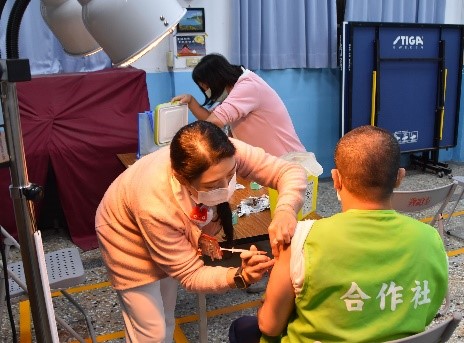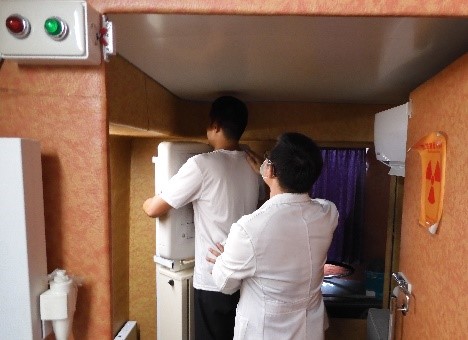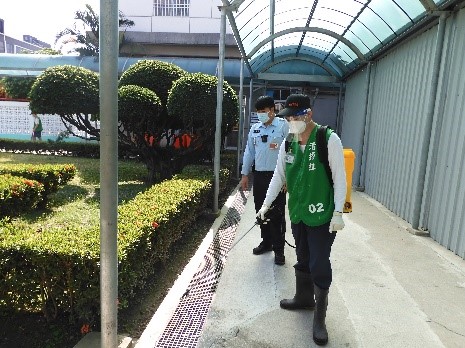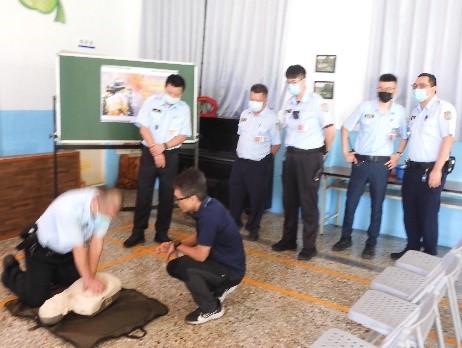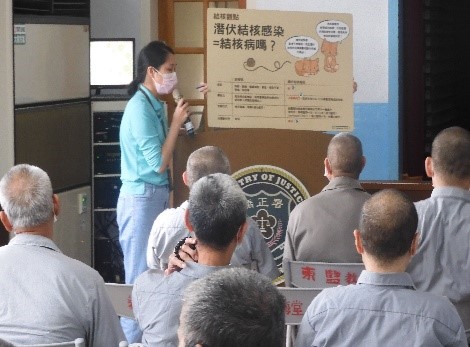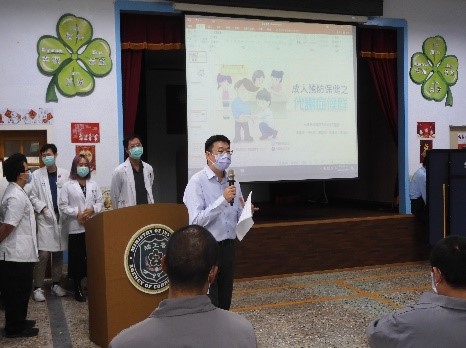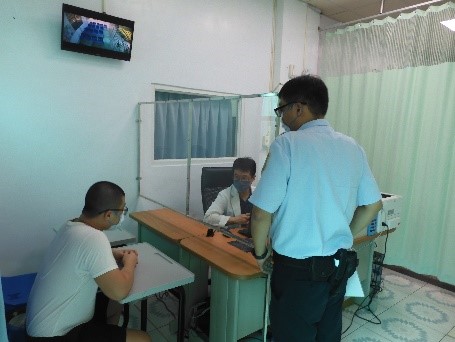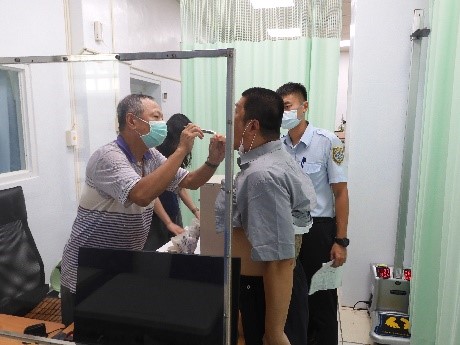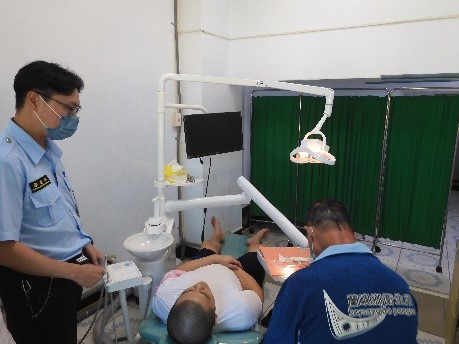Organization
- Publication Date :
- Last updated:2025-09-26
- View count:710
Director, one Secretary, Sections - Educational Assistance, Sanitation and Health, Guard and Control and General Affairs, and four Offices of Personnel, Accounting. The chiefs of these Sections and Offices organize several Directional Committees to oversee operations of investigation and classification, rehabilitation and education, health and hygiene, and vocational skill training.
Organization Chart
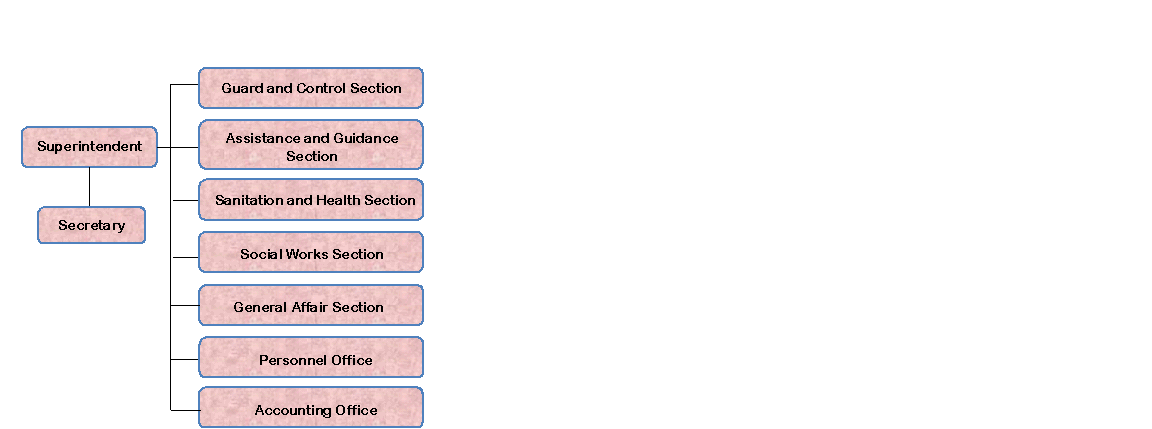
Section Guard And Control Section
- Affairs about patients, guardianship and detox.
- Management of patients, daily life.
- Door locks and key management.
- Training and duty distribution for administrative personnel.
- Affairs about weapons, detox & treatment and fire apparatus application, practice and safekeeping.
- Nourishment, clothes, bedding, and accessory distribution and safekeeping.
- Put sanitation and health affairs into effect.
- Investigate patients, behavior and condition.
- Meet with patients and mail their letters; handle objects sent to the center.
- Inspect and manage rooms and factories; patients, body search and their items.
- Award and punishment for patients.
- Abusers, sent under guard; pursue and capture after escapee.
- Other affairs related to patients, guardianship and detox.
Counseling Division – Main Responsibilities
- Counseling for Inmates under Rehabilitation:Provide psychological counseling, life guidance, and individual support to help inmates develop a positive mindset and maintain daily routines.
- Moral and Educational Instruction:Organize courses and lectures covering ethics, law, and life skills, promoting self-reflection and personal growth among inmates.
- Periodic Review of Inmate Treatment:Assess inmates’ progress, behavior, and adaptation at different stages, and adjust treatment plans accordingly.
- Requests for Suspension, Extension, or Exemption of Rehabilitation:Process and review applications for early suspension, extension, or exemption from rehabilitation according to regulations.
- Recreational Activities and Physical Training:Plan and implement sports, recreational, and wellness activities to enhance inmates’ physical and mental health.
- Guidance for Gatherings and Sectional Management:Organize and supervise group activities, ensuring order, safety, and effective sectional management.
- Vocational Assessment and Skills Training:Evaluate inmates’ abilities and strengths, and design appropriate vocational training programs.
- Skills Training Guidance and Work Assignment:Provide hands-on instruction, assign labor tasks reasonably, and strengthen self-management and responsibility.
- School-Work Cooperation and Post-Release Employment Guidance:Collaborate with businesses or educational institutions to offer internships, training, and employment counseling to support smooth reintegration into society.
- Management of News, Publications, and In-House Periodicals:Manage reading materials, news, and publications, encourage learning, and edit/produce internal facility periodicals.
- Other Counseling and Vocational Training Tasks:Include any other education, counseling, and vocational training duties not listed above, ensuring comprehensive development of inmates.
Social Work Division – Main Responsibilities
- Guidance for Inmates upon Admission:Provide orientation and guidance to inmates upon entry into the facility.
- Direct and Indirect Investigation of Inmates:Conduct direct interviews and indirect investigations to gather relevant information about inmates.
- Fingerprinting and Photograph Classification of Inmates:Collect and categorize fingerprints and photographs for identification and record-keeping purposes.
- Assessment of Family and Social Relationships and Disciplinary Handling:Evaluate inmates’family background and social connections, and handle related disciplinary or regulatory matters.
- Utilization of Social Resources:Identify and coordinate social services and community resources to support inmates’rehabilitation.
- Post-Release Follow-Up and Contact:Maintain contact with inmates after release to provide support and facilitate reintegration into society.
- Other Social Work Tasks:Include any additional social work duties not listed above, ensuring comprehensive support for inmates.
Sanitation and Health Section
- Supervise the Institute's health program and guidance of its facilities.
- Supervise the prevention of communicable infections diseases.
- Supervise drug addiction treatment for people receiving rehabilitation treatment.
- The physical examinations and urine collection and testing for people receiving rehabilitation treatment.
- Supervise the treatment and referral of people receiving rehabilitation treatment' illnesses.
- Supervise psychological counseling and treatment of mental illnesses for people receiving rehabilitation treatment.
- Supervise the management of patient ward.
- Supervise the dispensing, storage, and management of medical equipment.
- Supervise environmental sanitation and cleanliness inspections and guidance.
- Supervise the reporting and notification of people receiving rehabilitation treatment' illness or death.
- Other health-related matters.
Responsibility of general affair section
- File management and seal management.
- The affair related to the cashier, property,construction and repair, procurement and management.
- Admission, discharge and various fee charging and belonging keeping for inmates who receive rehabilitation treatment.
- Affairs related to food payment, keeping, and calculating, and reporting.
- Benefits planning and supervision for inmates; to deal with the aftermath of death.
- The management of public property.
- The management of manual worker, driver and etc.
- Affairs which not belong to other sections.
Courses in Stages for People Receiving Compulsory Rehabilitation Treatments
【3 Stages of Compulsory Rehabilitation Treatment】
Pursuant to articles set out in the Narcotic Hazard Prevention Act, offenders are to receive compulsory rehabilitation programs at a rehabilitation center for a minimum of six months, and a maximum of one year. For people receiving rehabilitation treatments, initial investigations, inductions, and evaluations will be conducted. Thereafter, the rehabilitation education programs will be implemented in 3 stages accordingly. Respectively, these 3 stages are: adjustment period, psychological counseling period, social adaptation period. Objectives and course contents of each treatment are as follows:
- Adaptation period
- Duration: three months.
- Objectives: the primary purpose of the adjustment period is to enable the illicit drug abusers under treatments to develop their stamina and perseverance, thereby enhancing their confidence in eliminating drug dependency.
- Course content: the focus for illicit drug abusers under treatments, is to encourage regimented lifestyles and to participate in social adaptation courses.
- Psychological counseling period
- Duration: three months.
- Objectives: the primary purpose of the psychological counseling period is to stimulate the illicit drug abusers’ motion of eliminating drug dependency and starting new lives, thereby assisting them in exterminating their psychological dependency on illicit substances.
3.Course content: the focus for illicit drug abusers under treatments, is to encourage regimented lifestyles, to acquire informed knowledge on illicit substances, and to participate in counseling courses.
- Social adaptation period
- Duration: two months..
- Objectives: the primary purpose of the social adaptation period is to rebuild the illicit drug abusers’ interpersonal skills and problem-solving abilities, thereby helping them re-establish new lives in society.
- Course content: the focus for illicit drug abusers under treatments, is to encourage regimented lifestyles, to make use of social resources, and to participate in social adaptation courses.
【Details of associated courses】
A wide array of courses is organized in the Center to enhance the lives of illicit drug abusers under treatments; they are encouraged to learn new skills to improve self-esteems, ideas on family and society, and to step up to lives without substances. Courses include sports and activities, religious studies, adaptation to life in the Center, addiction studies, legal education, health education, studies in humanities, professional treatments, counseling, work and leisure, career counseling and assistance, etc. These courses, individual or group counseling are implemented based on the aforementioned three respective stages. Details of associated courses are as follows:
Guidance services
Services provided by the psychologists in the Center include: group psychological assessment(screening), individual psychological assessment(counseling), individual psychotherapy(counseling), group psychotherapy (counseling) and follow-up counseling. The objectives for inmates are to regain mental health and exterminate their dependencies on illicit substances. Details are as follows:
- Group psychological assessment (screening):
When people receiving rehabilitation treatments first arrive at the Center, through a standard group assessment, emotions, physical and mental states and histories of mental illness of inmates will be preliminarily screened. Inmates who suffer from maladaptation or mental disorders can be detected and treated in the early stage; if required, they can be transferred for further treatments.
- Individual psychological assessment (counseling):
Assessment against an individual’s mental states is conducted based on psychological methods and knowledge. Our professional psychological assessment tools to assess inmates are featured with great credibility, validity and norm-referenced. Alongside systemic interviews and behavioral observations, overall evaluations on inmates’ mental states, personality traits and underlying issues provide references for future psychotherapies(counseling) and follow-up counseling.
- Individual psychotherapy (counseling):
Through one on one psychotherapies, inmates who suffer from emotional distress, mental illness, personality disorders or require attention are provided with psychological treatments against issues they experience. During therapies, inmates are instructed with emotion and stress management techniques, problem-solving skills, and approaches to sustain mental health. Through medium- or long-term one on one counseling, inmates receive ongoing support, which gives them strengths to look forward to the future with healthy meaningful purposes.
- Group psychotherapy(counseling):
For those people receiving rehabilitation treatments who have similar backgrounds and personal traits, they are grouped into small teams; this allows them to discuss issues they care about, to share common experiences, and to grow together. Our psychologists will lead those groups, encourage group members to exchange their experiences and ensure group orders. By further promoting communications and influences between members, they hope inmates’ self-awareness will be elevated to the next levels and be motivated to change for better lives.
- Follow-up counseling:
When rehabilitated inmates are discharged from the Center, for those who request or are willing to be contacted, follow-up counseling is offered; follow-up options include mail correspondence, phone consultations, or face to face sessions at the Center..
Introduction of the psychologists in the center
The so called “clinical psychologist” is a professional counselor who utilizes principles and methods of psychology to understand and change an individual. The Legislative Yuan on October 31st, 2001 enacted the “Psychologist Law”, specifying the following qualifications for taking the clinical psychologist examination:
1.Graduated from a domestic or foreign public, private university, independent college that is recognized by the Ministry of Education, R.O.C. as a student of the clinical psychology institute, department, section, or related psychology research institute with a major in clinical psychology, passed as an intern for at least one year, and has a master’s or higher academic degree.
2.Practiced clinical psychology one year in a medical institution before the enactment of this Law and has a master’s or higher academic degree from a psychology related institute, department, or section of a university or independent college.
3.Practiced clinical psychology two years in a medical institution before the enactment of this Law and has a junior college or higher level of education.
We currently have one qualified clinical psychologists;She have passed the Civil Service Level 3 Examination and possess a clinical psychologist certificate and license. What exactly are the service items of a clinical psychologist? According to the Psychologist Law, a clinical psychologist is responsible for the following affairs:
- Examination of general mental status and function.
- Examination of psychosis or brain mental functions.
- Counseling and psychotherapy of psychological development deviation and disorder.
- Counseling and psychotherapy of cognitive, emotional, or behavioral deviation and disorder.
- Counseling and psychotherapy of social adjustment deviation.
- Counseling and psychotherapy of neurosis.
- Psychotherapy of psychosis or brain mental functions.
- Other clinical psychologist practices approved by the central governing authority.
Articles 6 and 7 should be carried out according to a doctor’s diagnosis and notes or advice.
From the above we know that a clinical psychologist utilizes knowledge and methods of psychology to understand, evaluate, and treat. Besides eliminating current maladjusted behaviors of individuals, a clinical psychologist also tries to help them become mentally healthier.
Taitung Drug Abuser Treatment Center’s psychologists use their profession, passion, and service attitude and utilize internal and external resources to help inmates rid themselves of drug addictions or mental addiction. Moreover, they try to help inmates establish an active attitude towards their future paths.
Health Care:
- Upon admission to the Taitung Drug Abuser Center, People receiving rehabilitation treatment undergo physical and mental health examinations by a physician.
- New People receiving rehabilitation treatment undergo blood tests for HIV and syphilis, chest X-rays, and vaccinations for necessary infectious diseases.
- Health examinations are conducted quarterly, and drug abuse screenings are conducted periodically.
- Environmental disinfection.
- Provide various health and medical education programs, with experts and scholars providing promotional education.
- Provide basic physiological monitoring equipment and AED equipment.
Medical clinic service
- Since 2013, People receiving rehabilitation treatment have been covered by the National Health Insurance (NHI). Physicians from major hospitals have been stationed at various correctional institutions to provide medical examinations, consultations, and medication. Physicians from Taitung Hospital also assist in outpatient care.
- The Taitung Drug Abuser Center has departments of family medicine, internal medicine, psychiatry, traditional Chinese medicine, and dentistry.
- People receiving medical treatment with infectious diseases who need isolated medical care, and chronic illnesses receive consultations and medication prescriptions. If necessary, People receiving medical treatment are escorted to the hospital for examination and treatment.


